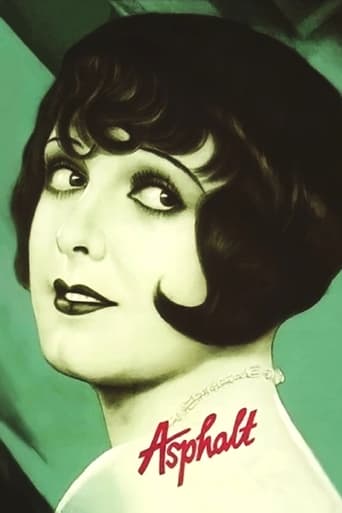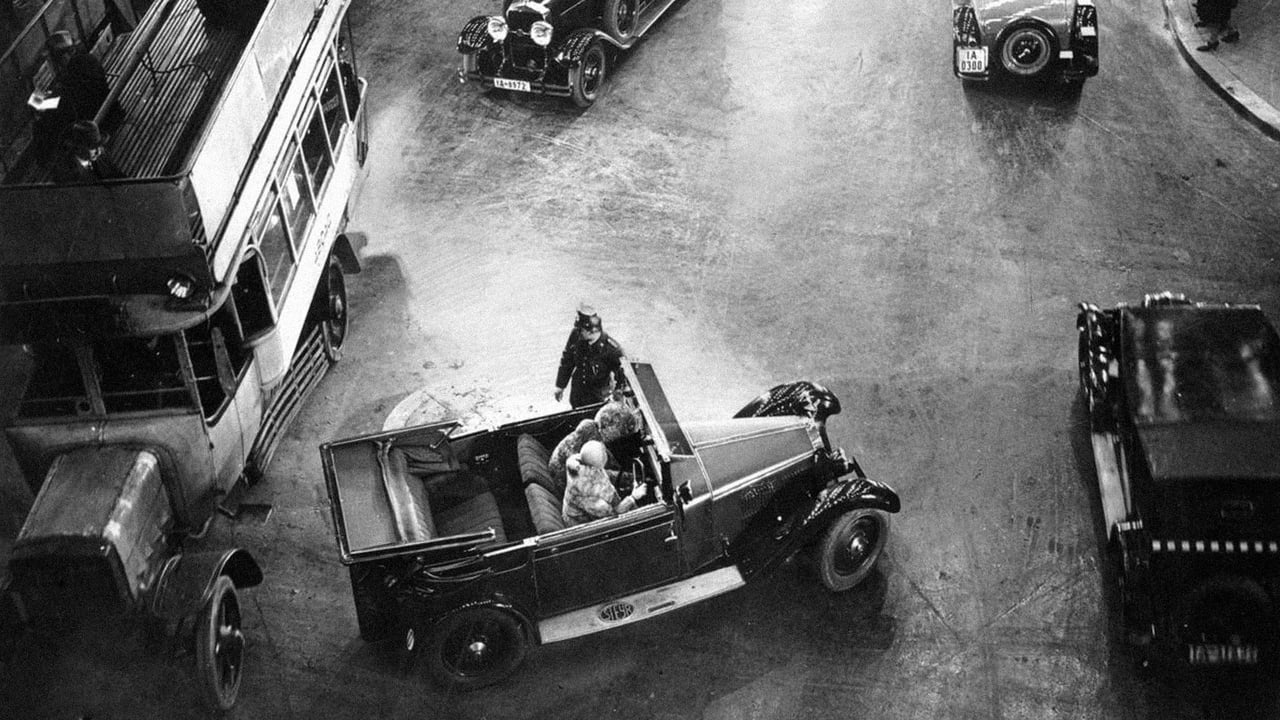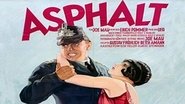zetes
It's a good film all around, but it's most notable for finding yet another remarkable silent beauty queen, Betty Amann, who could perhaps have been a huge star if the era had continued. With her jet-black bob-cut, she'll remind many of Louise Brooks, but, aside from a similar hairdo, she's not much like Brooks. The story concerns a cop (Metropolis' Gustav Froehlich) who picks up Amann for stealing a diamond from a jewelry store. She tries to seduce him so he'll let her go, but he's so morally upright she basically has to jump on top of him to get what she wants. Froehlich walks away from the situation bewildered, but also kind of in love with her. She, too, develops feelings for the poor little innocent, but odds are against them. Especially when her gangster boyfriend shows back up. I wouldn't quite group this among the silent masterpieces, but it's a fine film. And Amann really is wonderful (she would go on to co-star in Hitchcock's The Rich and the Strange, and she also pops up in Nancy Drew... Reporter). I think it might be a bit better known if not for the lousy title. "Asphalt" only really refers to Froehlich's job as a traffic cop, but I don't see what else it has to do with the film.
Claudio Carvalho
In Berlin, the dedicated traffic officer Albert Holk (Gustav Fröhlich) is a young man that lives with his parents. When the elegant and charming Else Kramer (Betty Amann) shoplifts a diamond in the Bergen Jewelry, the officer arrests her despite the request of the owner to release the youngster after retrieving the stone. They take a cab to the police station and Else first cries and then she unsuccessfully tries to seduce the uncorrupted officer. When they are in front of the precinct, Else asks Albert to go to her house first to get her documents. The reluctant officer finally accepts her request to go to her apartment and once there, she seduces him. On the next day, Albert feels guilty for failing on his duty. Else decides to return his documents that she had stolen in the previous night with a box of cigars. When the carrier delivers the envelope to Albert, he goes to Else's apartment offended with the bribe. But sooner he succumbs to the gorgeous lady and proposes her. Else questions the future of a policeman with a thief and shows that she stole the diamond for greed and not for need. Meanwhile, Else's lover Konsul Langen (Hans Adalbert Schlettow) returns from Paris where he had heisted the safe of a bank and finds Albert and Else together in her apartment. When Konsul pushes Else on the floor, Albert defends her and himself and their fight lead to a tragic conclusion. "Asphalt" is a dramatic German silent film and an early film-noir. The gorgeous dark-haired Betty Amann is one of the most expressive actresses I have ever seen, and her eyes are amazing in the close-ups. The sequence in the taxi with the tears in her eyes is fantastic. Her performance is remarkable and her character certainly is one of the first femme fatales of the cinema history. The dilemma of Albert Holk, shared between his duty and the seductive woman, is one of the best moments of this film. This film registers the streets of Berlin in the late 20's with a great traffic of buses and automobiles and crowded streets. The music score of this highly recommended DVD is also awesome. My vote is eight.Title (Brazil): "Asfalto" ("Asphalt")
jpb58
This late German silent film, Asphalt, was incredibly fun! It's an amazing treasure and treat for the eyes (and ears: it boasts a marvelous jazz score on the DVD that is perfect for the film!). No spoken dialogue needed in Asphalt to communicate sensuality, and in fact dialogue would ruin the intensity of this incredible film. An added plus is seeing Berlin in 1929, with all its decadence before National Socialist Hitler moved in and spoiled things in 1933. Starring the adorable, funny, and sensual Betty Amann, and the handsome Gustav Fröhlich from Metropolis, Asphalt tells the story of a puritan traffic cop (Gustav) who is tempted to sin with a jewel thief (Betty). His devoted parents trust him entirely and maybe that's part of his problem: he's been pampered and treated like a pet more than a son, obviously cushioned from much unpleasantry in life. In fact the father of the cop has his own pet, a little canary in a cage, and the mother of the cop has her son for her pet! In the art of silent film the director can emphasize small things like these and keep the audience's interest perked through symbolism. In sound films there rarely seems to be time devoted to this kind of creativity. My favorite scene is the long one where the cop has arrested the jewel thief and she cries and cries and cries (with the music making moaning sounds that are hilarious) and she tries to win his sympathy. She tries every trick in her book to keep from being taken to the police station. She begs him to take her to her apartment so she can get her papers. Exasperated with her, he does so. Once there the poor cop doesn't stand a chance. The climax of that scene really stunned me. I could swear Betty Amann said the F word, though of course I could be wrong because the film is German. ;) There's a somewhat predictable ending but it's how the director, Joe May, spins it all together, with artful, passionate camera-work, that keeps you on the edge of your seat.The two leads give incredible performances, especially Betty Amann. She had even more fire and intelligence in her portrayal of the jewel thief than any performance I've seen given by Clara Bow or Louise Brooks. Her career should have been better. The only other film I've seen her in is an early Hitchcock sound film Rich and Strange (1931). Gustav Fröhlich also shows a more tender side here than in Metropolis. A marvelous late German silent that must be seen to be believed. If you haven't watched it yet you are REALLY missing out! Don't get turned off by the unromantic title. Get it today!
MARIO GAUCI
I wasn't familiar with the work of director Joe May - apart from THE INVISIBLE MAN RETURNS (1940) and the Silent epic THE Indian TOMB (1921), a film I was disappointed by and which I always considered more of a Fritz Lang film anyway - although I had always been intrigued by this one and, now, thanks to Eureka and "Masters Of Cinema", I've managed to catch up with it.From watching ASPHALT - followed, in short order, by SPIONE (1928) and TARTUFFE (1925) - I've reacquainted myself with the peerless craftsmanship of German cinema during the 1920s; indeed, May's film is technically quite irreproachable - particularly his depiction of city-life by night, but also the opening montage (echoing contemporaneous Russian cinema) which forms part of the title sequence. Apart from this, the film's slight but compelling plot later became a staple of the noir genre where a naïve man is embroiled in the sordid life of a femme fatale with tragic consequences (the most obvious example, ironically enough, being perhaps Fritz Lang's superlative THE WOMAN IN THE WINDOW [1944]).In this regard, the film benefits greatly from the perfect casting of the two roles but especially the captivating Betty Amann, who effortlessly exudes sexuality throughout: distracting the elderly owner of the jewel shop with her considerable charms, while casually concealing one of the precious rocks in the tip of her umbrella; seducing the young, inexperienced traffic cop by excusing herself from his presence but, when he follows her into the bedroom, finds she has slipped under the sheets and is waiting for him; when he tries to leave, she literally leaps on him and, by wrapping herself around his waist, making it practically impossible for him not to give in to her. Also notable is a brief pickpocketing scene at the beginning featuring Hans Albers; the rather violent fight between the boy and the girl's elderly associate/lover, when the latter comes back to her apartment and catches them in flagrante, in which the furniture (conveniently held by visible wires) gets literally thrown around the room; the concluding act, then, marked by a number of twists (which lead to a sort of happy ending more akin to Bresson's spiritually-infused PICKPOCKET [1959] than the hard-boiled noirs it inspired), is enormously satisfying.


 AD
AD





